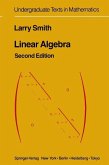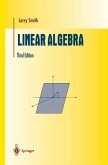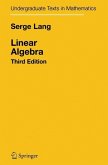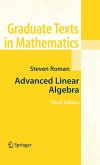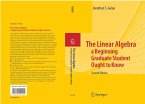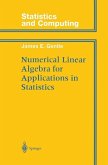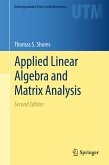--- "Current Science" (Review of the First Edition)
A cornerstone of undergraduate mathematics, science, and engineering, this clear and rigorous presentation of the fundamentals of linear algebra is unique in its emphasis and integration of computational skills and mathematical abstractions. The power and utility of this beautiful subject is demonstrated, in particular, in its focus on linear recurrence, difference and differential equations that affect applications in physics, computer science, and economics.
Key topics and features include:
* Linear equations, matrices, determinants, vector spaces, complex vector spaces, inner products, Jordan canonical forms, and quadratic forms
* Rich selection of examples and explanations, as well as a wide range of exercises at the end of every section
* Selected answers and hints
This second edition includes substantial revisions, new material on minimal polynomials and diagonalization, as well as a variety of new applications. The text will serve theoretical and applied courses and is ideal for self-study. With its important approach to linear algebra as a coherent part of mathematics and as a vital component of the natural and social sciences, "Linear Algebra, Second Edition" will challenge and benefit a broad audience.
Dieser Download kann aus rechtlichen Gründen nur mit Rechnungsadresse in A, B, BG, CY, CZ, D, DK, EW, E, FIN, F, GR, HR, H, IRL, I, LT, L, LR, M, NL, PL, P, R, S, SLO, SK ausgeliefert werden.
"This is a standard book on Linear Algebra for science and engineering students. It covers the usual topics, including the Jordan canonical form, a topic that is omitted in many recent books at this level.
The book reminded me of Strang's Linear Algebra and its Applications.... Like Strang, the authors discuss linear difference and differential equations at some length, which should be useful to students in applied sciences. Unlike Strang, however, Kwak and Hong follow a more traditional line of presentation, with numbered definitions, lemmas, theorems, and examples. This may make it easier for the student to use the book as a reference. The exposition is clear but the style is not as chatty as Strang's.
In summary, the book can be safely used as the basis for a course on Linear Algebra for the intended audience." -MAA Reviews
"The emphasis is on computational skills along with mathematical abstractions; basic concepts are introduced by means of matrices and the solution of systems of linear equations. Many illustrative examples are given and all the usual advanced topics are treated ... The second edition has been substantially revised and new sections have been added." (ZENTRALBLATT MATH)
"As linear algebra is one of the most important subjects in the study of science and engineering because of widespread applications in social or natural science, computer science, physics, or economics this book covers one of the most useful courses in undergraduate mathematics, providing essential tooks for industrial scientists. . . The primary purpose of the book is to give a careful presentation of the basic concepts of linear algebra as a coherent part of mathematics, and to illustrate its power and utility through applications of other disciplines.
---Educational Book Review



